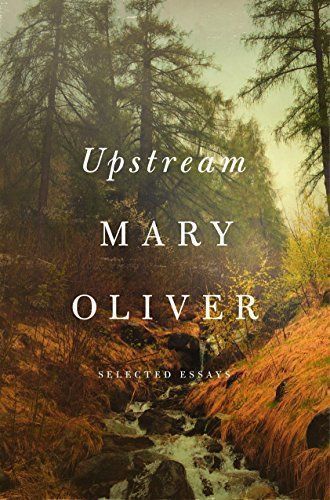
Upstream Selected Essays
In the beginning I was so young and such a stranger to myself I hardly existed. I had to go out into the world and see it and hear it and react to it, before I knew at all who I was, what I was, what I wanted to be. So begins "Upstream," a collection of essays in which beloved poet Mary Oliver reflects on her willingness, as a young child and as an adult, to lose herself within the beauty and mysteries of both the natural world and the world of literature. Emphasizing the significance of her childhood friend Walt Whitman, through whose work she first understood that a poem is a temple, a place to enter, and in which to feel, and who encouraged her to vanish into the world of her writing, Oliver meditates on the forces that allowed her to create a life for herself out of work and love. As she writes, I could not be a poet without the natural world. Someone else could. But not me. For me the door to the woods is the door to the temple. "Upstream," a radiant collection of essays with a new piece on Provincetown, follows Oliver as she contemplates the pleasure of artistic labor, her boundless curiosity for the flora and fauna that surround her, and the responsibility she has inherited from Shelley, Wordsworth, Emerson, Poe, and Frost, the great thinkers and writers of the past, to live thoughtfully, intelligently, and to observe with passion. Throughout this collection, Oliver positions not just herself upstream but us as well as she encourages us all to keep moving, to lose ourselves in the awe of the unknown, and to give power and time to the creative and whimsical urges that live within us."
Reviews
🏹@kenzia
Karolina@fox
༺ kat ༻@mutedspace
Ianna Chia@eyeyannuh
Maria@nocturnes
andrea valentina @virginiawoolf
Yetta Pahling@caffinedivinity
Kate Terry@1929stockcrash
Van @lunarfase
Derek Barlas@derekb
luca@bonesandall
Bri Billaney@spork
alma@phototropism
juno@tarobumma
Prashant Prasad@prashprash
Sameer Vasta@vasta
Linn @moonriver
Jen Taylor@jen_n_taylor
Trisa P@trisaprmt
taylor miles hopkins@bibette
nieves@alhajeros
Mar@somosmareas
Maggie Shay Jordan@heyitsmaggiej
Faye@fayesavanne
Highlights
taylor miles hopkins@bibette
Page 97
taylor miles hopkins@bibette
Page 91
taylor miles hopkins@bibette
Page 93
taylor miles hopkins@bibette
Page 149
taylor miles hopkins@bibette
Page 137
taylor miles hopkins@bibette
Page 136
taylor miles hopkins@bibette
Page 76
taylor miles hopkins@bibette
Page 60
taylor miles hopkins@bibette
Page 59
taylor miles hopkins@bibette
Page 57
taylor miles hopkins@bibette
Page 57
taylor miles hopkins@bibette
Page 58
開花@balintataw
Mar@somosmareas
Karolina@fox
Page 91
Laura Mei@thelibrariansnook
Page 20
Laura Mei@thelibrariansnook
Page 8
cee@reviensmoi
cee@reviensmoi
cee@reviensmoi
andrea valentina @virginiawoolf
Francesca @franci
Page 114
Francesca @franci
Page 63
Francesca @franci
Page 27